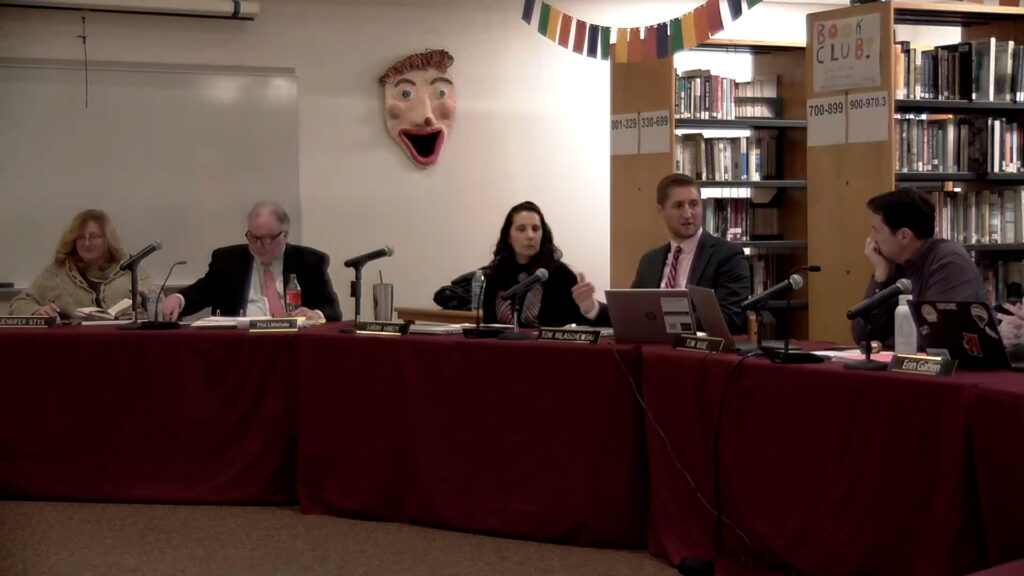FY26 Budget

Reading, MA — Superintendent of Schools Thomas Milaschewski presented his proposed $58,491,591 Fiscal Year 2026 school department budget to the School Committee on Thursday night. This amount is inclusive of $6,311,716 of special education accommodated costs. The proposed budget, which Milaschewski referred to as a “level-service” budget, will not reduce or retract any initiatives, programs, or positions created over the past several years.
The proposed budget is a 3.9% increase over the FY 2025 budget, which, according to Interim Director of Finance and Operations Philip Littlehale, fits within Finance Committee guidance for the overall FY 2026 budget for the Town of Reading.
To a round of applause from the committee, Milaschewski announced that the budget “finally” adds tuition-free full-day kindergarten for all Reading kindergarten students. “A lot of work and effort made this possible,” Milaschewski declared. The school department has been stepping down the cost of tuition for full-day kindergarten for five years in preparation for full absorption of this program into the budget. When Milaschewski arrived in Reading, it was one of only twenty-three districts in Massachusetts that required tuition to access full-day kindergarten, and Reading had the second-highest tuition in the state.
“Many families are happy about this,” Milaschewski declared.
Milaschewski began the budget presentation by thanking the committee and the community for its many investments over the past three years, which, according to Milaschewski, “create a better day-to-day experience for our students.” Highlighted in these investments are five school adjustment counselors/METCO site directors at the elementary schools, two middle school counselors, two math coaches, five elementary school assistant principals, and two special education teachers.
The committee also received a list of possible future investments, including building specific substitutes, a lift van for Reading Memorial High School, continuing curriculum advances, and middle school health teachers.
Littlehale then provided a cost center-by-cost center analysis of the proposed budget, noting that the regular day budget, which is close to 58% of the total budget, only is being raised by 1.6%. He continued to share that many of the costs in this center are offset by grants and other funding methods that skew the numbers. Littlehale shared that, by FY 2027, to create information sheets that more correctly indicate funding sources for all line items. He also noted that a few staff had previously been budgeted in the regular day cost center but should have been budgeted in the special education cost center. Making these corrections has reduced the growth percentage of regular day cost center while also adding to the growth factor of the special education cost center.
Littlehale indicated that a new system of naming job positions rather than people has been developed to help better track cost savings. By way of example, he shared that instead of saying, “Mrs. Smith retired was replaced by Mrs. Jones at a lower cost resulting in a savings,” reference would be made to “Kindergarten teacher 5” instead.
Littlehale explained that only 2.48% of the overall budget, or $1,447,959, is for administrative services, which he believes is far lower than the state average. He also expressed concern over the practice of using savings from other cost centers at the end of the fiscal year to cover the cost of technology replacement items, such as new laptops for students. Littlehale suggested that plans could be in the works to use capital resources to replace technology, but at this point, it was not allowed by the state. He intends that future budgets will plan for technology replacement expenses upfront.
Student advisors had raised the issue of technology replacement as a concern to the committee, and School Committee member Chuck Robinson indicated agreement with the plan. “Technology is everything these days,” Robinson noted.
During discussion on planned capital expenses, it was also suggested that “trades” could be made by using revolving funds to fund items in the town’s capital plan, allowing resources in that plan to be used for other needs. School Committee chair Thomas Wise provided an example that the food services revolving fund, which has seen healthy growth over the past few years, could be used to purchase a food services van, currently in the capital plan. The funding from the capital plan for that van could then be redirected to purchase a needed lift van for RMHS.
The School Committee will host a public hearing on the FY 2026 budget on January 23 at 7:00 in the RMHS library. It intends to vote on a final proposal to be forwarded to the Town Manager on January 30.
Liaison/Sub-Committee Reports
During her report, School Committee Carla Nazzaro, who also chairs the Killam School Building Committee (KSBC), reported that the KSBC intends to present the project to replace the Killam Elementary School to Town Meeting for approval this April. With Town Meeting’s approval, a debt exclusion for the project will be up for a town-wide vote in May. She also noted that the project at this point is “significantly under budget” and that current Massachusetts School Building Administration reimbursement is around $32 million. Nazzaro noted that the town would lose out on an amount if the voters did not approve the debt exclusion. She also shared that the KSBC is pursuing other grants to reduce the overall price tag for Reading taxpayers.
According to Nazzaro, the KSBC will review updated cost estimates at its January 22 meeting.
The School Committee adjourned at 8:30 pm.
